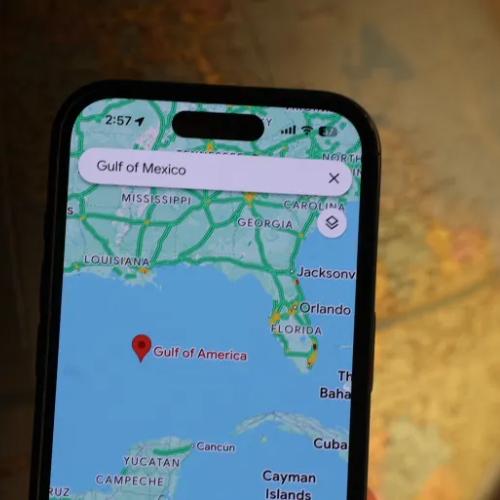Mexico has filed a lawsuit against Google after the tech giant changed the name of the Gulf of Mexico to the “Gulf of America” for U.S. users on Google Maps. The change, made following recent U.S. legislative actions, has sparked outrage in Mexico, leading to legal action by the Mexican government. This controversy centers on the interpretation of geographical boundaries and the role of tech companies in shaping public perception.
The Name Change Controversy
The Gulf of Mexico, historically and internationally recognized by that name, became the subject of controversy after a U.S. House of Representatives vote. Led by Marjorie Taylor Greene, a Republican lawmaker from Georgia, the legislation passed with strong support from Republicans. The bill seeks to make the name “Gulf of America” official for federal agencies, particularly for areas of the Gulf under U.S. jurisdiction.
This legislative push was part of former President Donald Trump’s broader agenda to rename geographical regions within U.S. control. Trump’s executive order applied only to the portion of the Gulf located in the U.S., not the entire Gulf of Mexico. However, despite this limited scope, Google extended the new name to the entire Gulf on Google Maps for U.S. users.
Mexico’s President Rejects US Troop Proposal: “Sovereignty Is Not for Sale”
In response, Mexico has raised concerns that Google’s action undermines international agreements and distorts historical geography. The decision to change the name has sparked protests, as many Mexicans view it as an attempt to ignore the country’s long-standing connection to the Gulf. For them, the Gulf of Mexico is a significant part of their national identity, and changing its name is seen as disrespectful.
The Lawsuit and Mexico’s Response
Claudia Sheinbaum, President of Mexico, confirmed that a lawsuit had been filed against Google. The Mexican government’s legal action challenges Google’s decision to apply the “Gulf of America” name across the entire body of water. While the specific details of the lawsuit have not been made public, Sheinbaum made it clear that Mexico was not willing to accept the change.
Mexico argues that the U.S. government’s policy applies only to the U.S. portion of the Gulf, and that no country has the right to rename an international body of water shared by multiple nations. Sheinbaum pointed out that the Gulf of Mexico should remain unchanged as it is recognized internationally, and that Google’s decision to use the new name could mislead millions of people.
This legal battle follows a warning issued by Sheinbaum in February, when the Mexican government made it clear that Google would face legal action unless the name change was reversed. Sheinbaum also humorously suggested that the United States could be renamed “América Mexicana” or “Mexican America,” reflecting a historical period before Mexico lost a significant portion of its land to the U.S. in the 19th century.
The Implications of the Dispute
This lawsuit between Mexico and Google is about more than just a name change—it reflects broader issues of national pride and the power of tech companies. The Gulf of Mexico has long been a symbol of Mexican heritage, and many in the country feel that renaming it to “Gulf of America” disrespects their connection to the region. Google’s decision to apply the new name for U.S. users has led to protests and calls for action.
Although the name change only affects Google Maps for U.S. users and does not alter international records, it highlights the influence that major tech companies can have on shaping global perceptions. Google Maps is one of the most widely used navigation tools, and millions of people could be misled into believing the new name is accurate.
In addition to the lawsuit, the situation has brought to the surface the ongoing political tensions between the United States and Mexico. These tensions have been fueled by a variety of issues, including trade disagreements and immigration policies, and this latest dispute only adds to the strained relationship between the two countries.
The legal challenge is just beginning, and it remains to be seen how the courts will respond. However, this case has already sparked debates about the role of tech giants in influencing global perceptions of geography and history. For many in Mexico, this is not just a fight over a name—it’s a fight for respect and recognition of their country’s place in the world.


